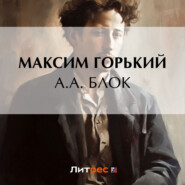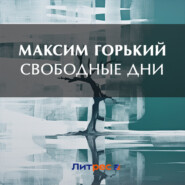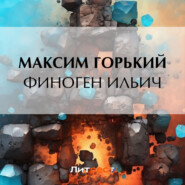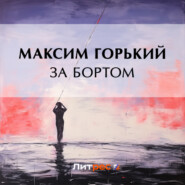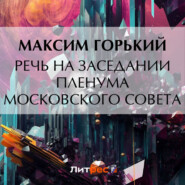По всем вопросам обращайтесь на: info@litportal.ru
(©) 2003-2025.
✖
Mother
Настройки чтения
Размер шрифта
Высота строк
Поля
"I remember."
But Ignaty was still distrustful of Nikolay's memory, and reiterated all the instructions, words, and signs, and finally extended his hand to him, saying:
"That's all now. Good-by, comrade. Give my regards to them. I'm alive and strong. The people there are good – you'll see." He cast a satisfied glance down at himself, stroked the overcoat, and asked the mother, "Shall I go?"
"Can you find the way?"
"Yes. Good-by, then, dear comrades."
He walked off, raising his shoulders high, thrusting out his chest, with his new hat cocked to one side, and his hands deep in his pockets in most dignified fashion. On his forehead and temples his bright, boyish curls danced gayly.
"There, now, I have work, too," said Vyesovshchikov, going over to the mother quietly. "I'm bored already – jumped out of prison – what for? My only occupation is hiding – and there I was learning. Pavel so pressed your brains – it was one pure delight. And Andrey, too, polished us fellows zealously. Well, Nilovna, did you hear how they decided in regard to the escape? Will they arrange it?"
"They'll find out day after to-morrow," she repeated, sighing involuntarily. "One day still – day after to-morrow."
Laying his heavy hand on her shoulder, and bringing his face close to hers, Nikolay said animatedly:
"You tell them, the older ones there – they'll listen to you. Why, it's very easy. You just see for yourself. There's the wall of the prison near the lamp-post; opposite is an empty lot, on the left the cemetery, on the right the streets – the city. The lamplighter goes to the lamp-post; by day he cleans the lamp; he puts the ladder against the wall, climbs up, screws hooks for a rope ladder onto the top of the wall, lets the rope ladder down into the prison yard, and off he goes. There inside the walls they know the time when this will be done, and will ask the criminals to arrange an uproar, or they'll arrange it themselves, and those who need it will go up the ladder over the wall – one, two, it's done. And they calmly proceed to the city because the chase throws itself first of all on the vacant lot and the cemetery."
He gesticulated rapidly in front of the mother's face, drawing his plan, the details of which were clear, simple, and clever. She had known him as a clumsy fellow, and it was strange to her to see the pockmarked face with the high cheek bones, usually so gloomy, now lively and alert. The narrow gray eyes, formerly harsh and cold, looking at the world sullenly with malice and distrust, seemed to be chiseled anew, assuming an oval form and shining with an even, warm light that convinced and moved the mother.
"You think of it – by day, without fail by day. To whom would it occur that a prisoner would make up his mind to escape by day in the eyes of the whole prison?"
"And they'll shoot him down," the woman said trembling.
"Who? There are no soldiers, and the overseers of the prison use their revolvers to drive nails in."
"Why, it's very simple – all this."
"And you'll see it'll all come out all right. No. You speak to them. I have everything prepared already – the rope ladder, the screw hooks; I spoke to my host, he'll be the lamplighter."
Somebody stirred noisily at the door and coughed, and iron clanked.
"There he is!" exclaimed Nikolay.
At the open door a tin bathtub was thrust in, and a hoarse voice said:
"Get in, you devil."
Then a round, gray, hatless head appeared. It had protruding eyes and a mustache, and wore a good-natured expression. Nikolay helped the man in with the tub. A tall, stooping figure strode through the door. The man coughed, his shaven cheeks puffing up; he spat out and greeted hoarsely:
"Good health to you!"
"There! Ask him!"
"Me? What about?"
"About the escape."
"Ah, ah!" said the host, wiping his mustache with black fingers.
"There, Yakob Vasilyevich! She doesn't believe it's a simple matter!"
"Hm! she doesn't believe! Not to believe means not to want to believe. You and I want to, and so we believe." The old man suddenly bent over and coughed hoarsely, rubbed his breast for a long time, while he stood in the middle of the room panting for breath and scanning the mother with wide-open eyes.
"I'm not the one to decide, Nikolay."
"But, mother, you talk with them. Tell them everything is ready. Ah, if I could only see them! I'd force them!" He threw out his hands with a broad gesture and pressed them together as if embracing something firmly, and his voice rang with hot feeling that astounded the mother by its power.
"Hm! what a fellow you are!" she thought; but said aloud: "It's for Pasha and the comrades to decide."
Nikolay thoughtfully inclined his head.
"Who's this Pasha?" asked the host, seating himself.
"My son."
"What's the family?"
"Vlasov."
He nodded his head, got his tobacco pouch, whipped out his pipe and filled it with tobacco. He spoke brokenly:
"I've heard of him. My nephew knows him. He, too, is in prison – my nephew Yevchenko. Have you heard of him? And my family is Godun. They'll soon shut all the young people in prison, and then there'll be plenty and comfort for us old folks. The gendarme assures me that my nephew will even be sent to Siberia. They'll exile him – the dogs!"
Lighting his pipe, he turned to Nikolay, spitting frequently on the floor:
"So she doesn't want to? Well, that's her affair! A person is free to feel as he wants to. Are you tired of sitting in prison? Go. Are you tired of going? Sit. They robbed you? Keep still. They beat you? Bear it. They have killed you? Stay dead. That's certain. And I'll carry off Savka; I'll carry him off!" His curt, barking phrases, full of good-natured irony, perplexed the mother. But his last words aroused envy in her.
While walking along the street in the face of a cold wind and rain, she thought of Nikolay, "What a man he's become! Think of it!" And remembering Godun, she almost prayerfully reflected, "It seems I'm not the only one who lives for the new. It's a big fire if it so cleanses and burns all who see it." Then she thought of her son, "If he only agreed!"
On Sunday, taking leave of Pavel in the waiting room of the prison, she felt a little lump of paper in her hand. She started as if it burned her skin, and cast a look of question and entreaty into her son's face. But she found no answer there. Pavel's blue eyes smiled with the usual composed smile familiar to her.
"Good-by!" she sighed.
The son again put out his hand to her, and a certain kindness and tenderness for her quivered on his face. "Good-by, mamma!"
She waited without letting go of his hand. "Don't be uneasy – don't be angry," he said.
These words and the stubborn folds between his brows answered her question. "Well, what do you mean?" she muttered, drooping her head. "What of it?" And she quickly walked away without looking at him, in order not to betray her feelings by the tears in her eyes and the quiver of her lips. On the road she thought that the bones of the hand which had pressed her son's hand ached and grew heavy, as if she had been struck on the shoulder.
At home, after thrusting the note into Nikolay's hand, she stood before him, and waited while he smoothed out the tight little roll. She felt a tremor of hope again; but Nikolay said:
"Of course, this is what he writes: 'We will not go away, comrade; we cannot, not one of us. We should lose respect for ourselves. Take into consideration the peasant recently arrested. He has merited your solicitude; he deserves that you expend much time and energy on him. It's very hard for him here – daily collisions with the authorities. He's already had the twenty-four hours of the dark cell. They torture him to death. We all intercede for him. Soothe and be kind to my mother; tell her; she'll understand all. Pavel.'"
The mother straightened herself easily, and proudly tossed her head.
"Well, what is there to tell me?" she said firmly. "I understand – they want to go straight at the authorities again – 'there! condemn the truth!'"
But Ignaty was still distrustful of Nikolay's memory, and reiterated all the instructions, words, and signs, and finally extended his hand to him, saying:
"That's all now. Good-by, comrade. Give my regards to them. I'm alive and strong. The people there are good – you'll see." He cast a satisfied glance down at himself, stroked the overcoat, and asked the mother, "Shall I go?"
"Can you find the way?"
"Yes. Good-by, then, dear comrades."
He walked off, raising his shoulders high, thrusting out his chest, with his new hat cocked to one side, and his hands deep in his pockets in most dignified fashion. On his forehead and temples his bright, boyish curls danced gayly.
"There, now, I have work, too," said Vyesovshchikov, going over to the mother quietly. "I'm bored already – jumped out of prison – what for? My only occupation is hiding – and there I was learning. Pavel so pressed your brains – it was one pure delight. And Andrey, too, polished us fellows zealously. Well, Nilovna, did you hear how they decided in regard to the escape? Will they arrange it?"
"They'll find out day after to-morrow," she repeated, sighing involuntarily. "One day still – day after to-morrow."
Laying his heavy hand on her shoulder, and bringing his face close to hers, Nikolay said animatedly:
"You tell them, the older ones there – they'll listen to you. Why, it's very easy. You just see for yourself. There's the wall of the prison near the lamp-post; opposite is an empty lot, on the left the cemetery, on the right the streets – the city. The lamplighter goes to the lamp-post; by day he cleans the lamp; he puts the ladder against the wall, climbs up, screws hooks for a rope ladder onto the top of the wall, lets the rope ladder down into the prison yard, and off he goes. There inside the walls they know the time when this will be done, and will ask the criminals to arrange an uproar, or they'll arrange it themselves, and those who need it will go up the ladder over the wall – one, two, it's done. And they calmly proceed to the city because the chase throws itself first of all on the vacant lot and the cemetery."
He gesticulated rapidly in front of the mother's face, drawing his plan, the details of which were clear, simple, and clever. She had known him as a clumsy fellow, and it was strange to her to see the pockmarked face with the high cheek bones, usually so gloomy, now lively and alert. The narrow gray eyes, formerly harsh and cold, looking at the world sullenly with malice and distrust, seemed to be chiseled anew, assuming an oval form and shining with an even, warm light that convinced and moved the mother.
"You think of it – by day, without fail by day. To whom would it occur that a prisoner would make up his mind to escape by day in the eyes of the whole prison?"
"And they'll shoot him down," the woman said trembling.
"Who? There are no soldiers, and the overseers of the prison use their revolvers to drive nails in."
"Why, it's very simple – all this."
"And you'll see it'll all come out all right. No. You speak to them. I have everything prepared already – the rope ladder, the screw hooks; I spoke to my host, he'll be the lamplighter."
Somebody stirred noisily at the door and coughed, and iron clanked.
"There he is!" exclaimed Nikolay.
At the open door a tin bathtub was thrust in, and a hoarse voice said:
"Get in, you devil."
Then a round, gray, hatless head appeared. It had protruding eyes and a mustache, and wore a good-natured expression. Nikolay helped the man in with the tub. A tall, stooping figure strode through the door. The man coughed, his shaven cheeks puffing up; he spat out and greeted hoarsely:
"Good health to you!"
"There! Ask him!"
"Me? What about?"
"About the escape."
"Ah, ah!" said the host, wiping his mustache with black fingers.
"There, Yakob Vasilyevich! She doesn't believe it's a simple matter!"
"Hm! she doesn't believe! Not to believe means not to want to believe. You and I want to, and so we believe." The old man suddenly bent over and coughed hoarsely, rubbed his breast for a long time, while he stood in the middle of the room panting for breath and scanning the mother with wide-open eyes.
"I'm not the one to decide, Nikolay."
"But, mother, you talk with them. Tell them everything is ready. Ah, if I could only see them! I'd force them!" He threw out his hands with a broad gesture and pressed them together as if embracing something firmly, and his voice rang with hot feeling that astounded the mother by its power.
"Hm! what a fellow you are!" she thought; but said aloud: "It's for Pasha and the comrades to decide."
Nikolay thoughtfully inclined his head.
"Who's this Pasha?" asked the host, seating himself.
"My son."
"What's the family?"
"Vlasov."
He nodded his head, got his tobacco pouch, whipped out his pipe and filled it with tobacco. He spoke brokenly:
"I've heard of him. My nephew knows him. He, too, is in prison – my nephew Yevchenko. Have you heard of him? And my family is Godun. They'll soon shut all the young people in prison, and then there'll be plenty and comfort for us old folks. The gendarme assures me that my nephew will even be sent to Siberia. They'll exile him – the dogs!"
Lighting his pipe, he turned to Nikolay, spitting frequently on the floor:
"So she doesn't want to? Well, that's her affair! A person is free to feel as he wants to. Are you tired of sitting in prison? Go. Are you tired of going? Sit. They robbed you? Keep still. They beat you? Bear it. They have killed you? Stay dead. That's certain. And I'll carry off Savka; I'll carry him off!" His curt, barking phrases, full of good-natured irony, perplexed the mother. But his last words aroused envy in her.
While walking along the street in the face of a cold wind and rain, she thought of Nikolay, "What a man he's become! Think of it!" And remembering Godun, she almost prayerfully reflected, "It seems I'm not the only one who lives for the new. It's a big fire if it so cleanses and burns all who see it." Then she thought of her son, "If he only agreed!"
On Sunday, taking leave of Pavel in the waiting room of the prison, she felt a little lump of paper in her hand. She started as if it burned her skin, and cast a look of question and entreaty into her son's face. But she found no answer there. Pavel's blue eyes smiled with the usual composed smile familiar to her.
"Good-by!" she sighed.
The son again put out his hand to her, and a certain kindness and tenderness for her quivered on his face. "Good-by, mamma!"
She waited without letting go of his hand. "Don't be uneasy – don't be angry," he said.
These words and the stubborn folds between his brows answered her question. "Well, what do you mean?" she muttered, drooping her head. "What of it?" And she quickly walked away without looking at him, in order not to betray her feelings by the tears in her eyes and the quiver of her lips. On the road she thought that the bones of the hand which had pressed her son's hand ached and grew heavy, as if she had been struck on the shoulder.
At home, after thrusting the note into Nikolay's hand, she stood before him, and waited while he smoothed out the tight little roll. She felt a tremor of hope again; but Nikolay said:
"Of course, this is what he writes: 'We will not go away, comrade; we cannot, not one of us. We should lose respect for ourselves. Take into consideration the peasant recently arrested. He has merited your solicitude; he deserves that you expend much time and energy on him. It's very hard for him here – daily collisions with the authorities. He's already had the twenty-four hours of the dark cell. They torture him to death. We all intercede for him. Soothe and be kind to my mother; tell her; she'll understand all. Pavel.'"
The mother straightened herself easily, and proudly tossed her head.
"Well, what is there to tell me?" she said firmly. "I understand – they want to go straight at the authorities again – 'there! condemn the truth!'"












